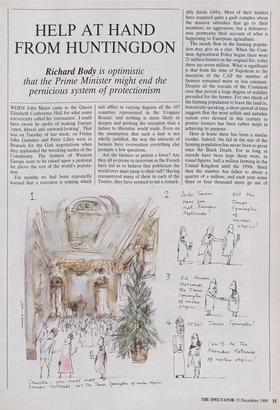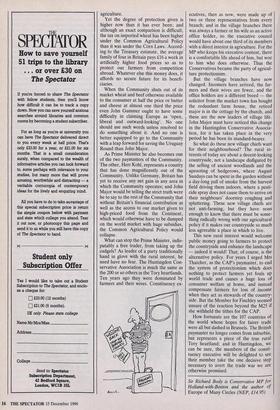HELP AT HAND FROM HUNTINGDON
Richard Body is optimistic
that the Prime Minister might end the pernicious system of protectionism
WHEN John Major came to the Queen Elizabeth Conference Hall for what some irreverently called his 'coronation', I could have sworn he spoke of making Europe 'open, liberal and outward-looking'. That was on Tuesday of last week; on Friday John Gummer and Peter Lilley were in Brussels for the Gatt negotiations when they applauded the wrecking tactics of the Community. The farmers of Western Europe were to be raised upon a pedestal far above the rest of the world's popula- tion. For months we had been repeatedly warned that a recession is coming which will afflict in varying degrees all the 107 countries represented in the Uruguay Round, and nothing is more likely to deepen and prolong the recession than a failure to liberalise world trade. Even on the assumption that such a fear is not wholly justified, the way the interests of farmers have overwritten everything else prompts a few questions. Are the farmers so potent a force? Are they all so prone to terrorism as the French have led us to believe that politicians the world over must jump to their call? Having encountered many of them in each of the Twelve, they have seemed to me a remark- ably docile lobby. Most of their leaders have acquired quite a guilt complex about the massive subsidies that - go to their members; no aggression, but a defensive- ness permeates their account of what is happening to European agriculture.
The steady flow in the farming popula- tion may give us a clue. When the Com- mon Agricultural Policy began there were 21 million farmers in the original Six; today there are seven million. What is significant is that from the time of Napoleon to the inception of the CAP the number of farmers remained more or less constant. Despite all the travails of the Continent over that period a large degree of stability prevailed for the farmer. For two thirds of the farming population to leave the land in, historically speaking, a short period of time suggests that the most selfish and autarkic system ever devised in this century to protect farmers has been rather inept in achieving its purpose.
Here at home there has been a similar exodus. Indeed, the fall in the size of the farming population has never been so great since the Black Death. For as long as records have been kept there were, in round figures, half a million farming in the United Kingdom until the 1950s. Since then the number has fallen to about a quarter of a million; and each year some three or four thousand more go out of agriculture.
Yet the degree of protection given is higher now than it has ever been; and although an exact comparison is difficult, the tax on imported wheat has been higher under the Common Agricultural Policy than it was under the Corn Laws. Accord- ing to the Treasury estimate, the average family of four in Britain pays £16 a week in artificially higher food prices so as to protect our farmers from competition abroad. Whatever else this money does, it affords no secure future for its benefi- ciaries.
When the Community shuts out of its market wheat and beef otherwise available to the consumer at half the price or butter and cheese at almost one third the price even John Gummer ought to have some difficulty in claiming Europe as 'open, liberal and outward-looking'. No one should use such words unless resolved to do something about it. And no one is better equipped to go to the Community with a leap forward for saving the Uruguay Round than John Major.
As Prime Minister he also becomes one of the two paymasters of the Community. The other, Herr Kohl, represents a country that has done magnificently out of the Community. Unlike Germany, Britain has yet to receive any net gain in any area in which the Community operates; and John Major would be telling the strict truth were he to say to the rest of the Community that without Britain's financial contribution as well as the access to our market given to high-priced food from the Continent, which would otherwise have to be dumped on the world market with huge subsidies, the Common Agricultural Policy would collapse.
What can stop the Prime Minister, indis- putably a free trader, from taking up the cudgels? As leader of a party traditionally hand in glove with the rural interest, he need have no fear. The Huntingdon Con- servative Association is much the same as the 200 or so others in the Tory heartlands. Ten years ago they were dominated by farmers and their wives. Constituency ex- ecutives, then as now, were made up of two or three representatives from every branch; and in the village branches there was always a farmer or his wife as an active office holder, so the executive council would have about one third of its members with a direct interest in agriculture. For the MP who keeps his executive content, there is a comfortable life ahead of him, but woe to him who does otherwise. Thus the Conservatives became the party of agricul- ture protectionism.
But the village branches have now changed. Incomers have arrived, the far- mers and their wives are fewer, and the office holders are a different breed — the solicitor from the market town has bought the redundant farm house, the retired major is in the cottage by the church, and these are the new leaders of village life. John Major must have noticed this change in the Huntingdon Conservative Associa- tion, for it has taken place in the very period he has been its standard-bearer.
So what do these new village chiefs want for their neighbourhood? The rural in- terests of today are about a decent-looking countryside, not a landscape disfigured by the selling of ancient woodlands and the uprooting of hedgerows, where August Sundays can be spent in the garden without a day-long pall of smoke from the harvest field driving them indoors, where a pesti- cide spray does not cause them to arrive on • their neighbours' doorstep coughing and spluttering. These new village chiefs are not anti-farming, but they have nous enough to know that there must be some- thing radically wrong with our agricultural policy if it makes our countryside so much less agreeable a place in which to live.
This new rural interest would welcome public money going to farmers to protect the countryside and enhance the landscape — indeed it would! That, of course, is the alternative policy. For years I urged Mrs Thatcher, as the CAP's paymaster, to end the system of protectionism which does nothing to protect farmers yet fouls up world trade and causes a huge loss of consumer welfare at home, and instead compensate farmers for loss of income when they act as stewards of the country- side. But the Member for Finchley seemed unsure of the reaction beyond the M25 if she withheld the tithes for the CAP.
How fortunate are the 107 countries of the world whose hopes for fairer trade were all but dashed in Brussels. The British paymaster no longer comes from suburbia, but represents a piece of the true rural Tory heartland; and in Huntingdon, we can be sure, the members of the consti- tuency executive will be delighted to see their member take the one decisive step necessary to avert the trade war we are otherwise promised.
Sir Richard Body is Conservative MP for Holland-with-Boston and the author of Europe of Many Circles (NEP, £14.95)



























































 Previous page
Previous page